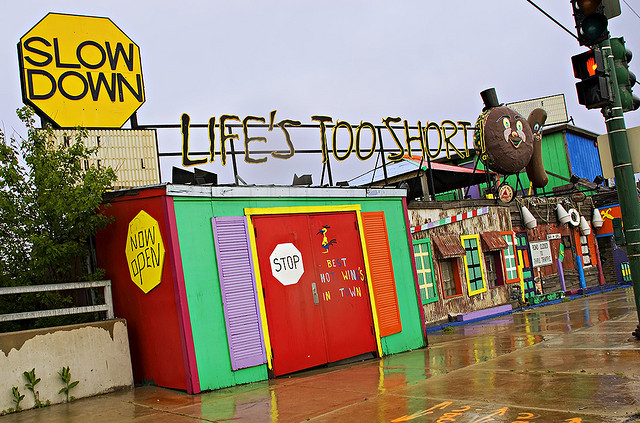I’ve talked through some of the nuts and bolts issues with the podcast assignments with the first two groups, but now that the first episode is up and we’ve worked through some of the kinks, I want to put all this down in writing for future groups.
Equipment and Software
The Music and Media Library has a number of microphones available for checkout, including Snowball and Snowflake microphones. They aren’t on that list, but I believe they also have a box full of older iPod Nanos with microphone attachments that should work pretty well for recording voice too.
Audacity is a good, free, open-source audio editor (available for Windows, Mac, and Linux). There is a very good tutorial wiki for Audacity online — this basic page on mixing voice narration with music probably covers 90% of what you’ll need to do for your podcast. It’s not terribly difficult, but there is a learning curve to it and you should definitely make an extra copy of your raw audio files before you start mixing and editing them. Expect for it to take longer than you think it should to do the sound editing and build time for mixing into your plans. There are some students in the class who have a fair amount of experience working with Audacity — make friends with them and ask them for help (make sure to give thanks for their help in your episode credits!).
Exporting as an MP3: Note that probably the most complicated part of using Audacity will be configuring the MP3 encoder. Because of copyright laws, Audacity does not come with a native MP3 encoder so you can’t export as MP3 straight out of the box. You’ll need to download and configure an extra plugin to do so.
Student Digital Life also has lots of resources that should be of use to you with this project. If you want to use more advanced software, the Media Lab has the full Adobe Creative Suite, including Adobe Audition, available and student assistants who can help you in using it. The Tech Lab is also a great space for you to go to get ideas about how to approach these projects. There are also gaming consoles available in Cox Computing. If you want to do an episode on a console game and need a space to have your friends play and record audio with them, those might be really useful. Let me know if you need to reserve a particular time (gaming consoles are usually first come, first serve but for an academic use the SDL folks have indicated that they might be able to set up reservations — but you should probably run that through me instead of just going up to whomever is working the front desk and asking for a reservation).
Meeting
You should plan to meet with me a couple of weeks before your episode is due so that you can fill me in on your plans, we can brainstorm ideas, and you can ask me any questions that have come up. Try to come into the meeting with a paragraph of text outlining what you hope to achieve — think of it as an articulation of your hypothesis. You are the producers of the episode, which means you’ve got ownership of the it and make the decisions about how to get your episode together. I’m the executive producer, which means it’s my role to help you to achieve the goals you set for your episode while also ensuring that you meet the expectations for the series as a whole. These meetings should be collaborative negotiations.
Collaborating
You are allowed to bring in friends or other people from outside the class to take part in your podcast. If you ask someone from outside the class to appear in your episode, you should get them to fill out a media release form. Note that the form asks whether the person wants to be identified by a pseudonym, first name, or full name — make sure that they let you know and then use whichever method they choose to identify them during the episode credits section at the end of your podcast. You can also ask fellow classmates to appear in your episode, either to be interviewed or to serve as vocal talent. I hope that most of you will serve as narrators of your own episodes but if you really don’t want to do so, you can script the narrative that you want and then ask a fellow student to record it for you (again, make sure to thank them in your credits!).
If I can ever get the achievements system fully working, I’ll award students in the class who aren’t producers on an episode but who provide vocal talents or other assistance with achievement badges for doing so.
Episode Structure
You are responsible for creating the audio for your episode, which includes an introduction that provides a title for your individual episode and the names of the two producers; the primary content of the episode itself, which should be about ten minutes in length; and a closing credit section for your individual episode in which you provide the title for any music that you have used and thank people who contributed to it.
You are encouraged to mix music, interviews, and sound effects or ambient sounds into your episode.
Turning It In
Once you’ve got the audio for your episode, upload the audio to Google Drive and then send it to me — preferably as an MP3 but if you have trouble exporting it that way, you can send the Audacity project file. If you have trouble with sending it, let me know. Include in your email a short paragraph describing the podcast and a text version of your comments. If you have someone from outside the class in your podcast, send me a copy of their media release form or give it to me as a hard copy during the next class session.
Send me the file by the Friday when your episode is due. I will take your episode and place it into the template for the series, adding on the series introduction and the series credit pieces. Then I’ll upload the episode to our Soundcloud playlist and include it in the RSS feed so that it pushes out to iTunes and to anyone who’s subscribed to the podcast. I’ll also publish a post to the podcast category page on the site with a Soundcloud embed.
Reflection
Once you’ve submitted your episode, each of the producers should write their own podcast reflection post on their own individual sites, with an embed of the Soundcloud episode at the top and then your reflection included below.







